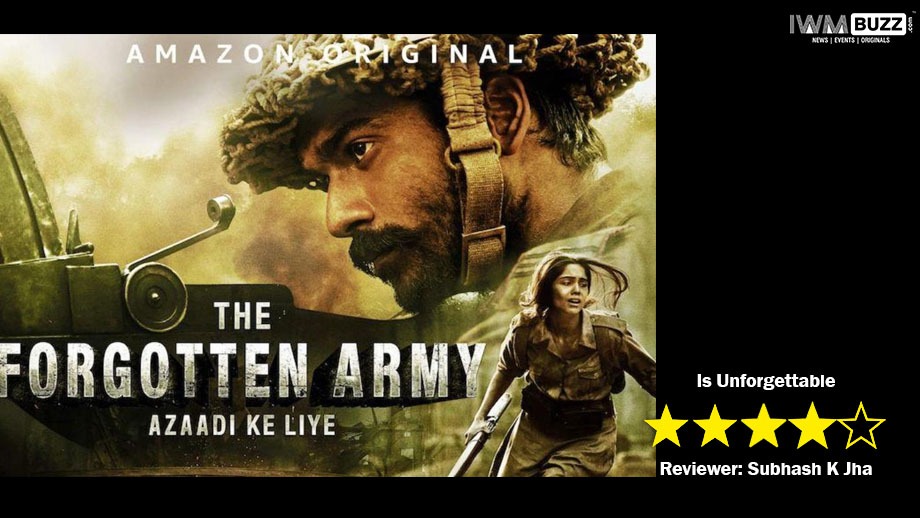The Forgotten Army: Azaadi Ke Liye (Amazon Prime Video)
Starring Sunny Kaushal, M K Raina, Sharvari Wagh
Written & Directed by Kabir Singh
Rating: **** (4 stars)
The sheer volume of emotional and physical distance that Kabir Khan covers in the five episodes of this homage to the soldierly valour of Netaji Subhash Chandra Bose’s breakaway army is mindboggling. But then Kabir is no stranger to impossible challenges. In Bajrangi Bhaijaan he actually made Salman Khan ACT. Remember?
There is a gallery of competent actors surrendering to their characters, not unlike the Indian POW in this film who lay down their weapons before the Japanese in the hope that their country would be freed of British rule through the new alliance.
The politics of The Forgotten Army is complex. Kabir Khan doesn’t shy away from biting into those bitter politics of a time when Gandhi was God, and self-governance was a religion. By exploring the most neglected subsidiary of the Indian Freedom Movement—the contribution of Netaji Subhas Chandra Bose and his Indian National Army(INA) this spellbinding series weaves a web of unforgettable images.
The battle sequences are to die for, in a manner of speaking. I was specially awestruck by the sequence where a young Indian girl Rasamma (T J Bhanu) is chased down by a Gora soldier and brutally raped, when suddenly hundreds of Japanese soldiers descend on bicycles peddling with a passion that indicates determination.
Miraculously Kabir’s tone of narration jumps over puddles of sentimentality and mawkishness, maintaining a tightly reined-in mood throughout. Even when portions of the love story gets predictable, Kabir infuses the familiar with a sense of wonderment
A determined vision embraces Kabir Khan’s narrative. He negotiates his plot through two different time zones. In one, young soldier Sodhi (Sunny Kausal, admirable) befriends and falls in love with a soldier colleague Maya (Sharvari Wagh) as canons, bombs guns and rhetorics boom in the background. In another time-zone Sodhi, now in his 70s, and played by the commanding M K Raina, interacts with his young journalist-grandson amidst the turmoil of student unrest in Burma.
Admittedly the going gets overly dramatic towards the end with Sodhi and Maya’s love story threatening to over-run the film’s combative fulcrum. However, the editing and performances ensure a safe landing for this soaring drama of unadulterated nationalism. Miraculously Kabir’s tone of narration jumps over puddles of sentimentality and mawkishness, maintaining a tightly reined-in mood throughout. Even when portions of the love story gets predictable Kabir infuses the familiar with a sense of wonderment.
Scores of actors surrender to their characters in a way that shows their commitment to bringing alive the atmosphere of impassioned patriotism. Gender dynamics are brought in fluently in the way the men in the INA respond the women’s wing. There is one specially stirring sub-plot about a leery South Indian flautist soldier who learns to respect his female colleagues through his love for one of them. I’d love to see a whole film devoted to these two characters.
When the soldiers in this series salute to one another an electric current passes from one to the other and then to us in the audience.
While M K Raina and Rohit Chaudhary stand out as the older version of Sodhi and Sodhi’s best friend in the army, respectively, it is Sunny Kaushal who holds the dilating strands of the plot together with his credible and often incredible performance. After seeing what Sunny has done in this film about a forgotten chapter of the Indian freedom movement, I have to concede that Sunny is a better actor than his star-brother Vicky Kaushal. His commitment to the screenplay is singular.
The Forgotten Army is an admirable work of cinema with a canvas that accommodates generation of anguish for the raw deal given to Netaji Subhas Chandra Bose by those who wrote the history books. Kabir Khan’s superbly crafted series doesn’t rewrite history. It throws forward a volley of passionate arguments and images in support of an unsung hero. The canvas is as large as the filmmaker’s ambitions. This is a film to be watched on the big screen, not on the phone. That’s more disservice to Netaji’s memory.


